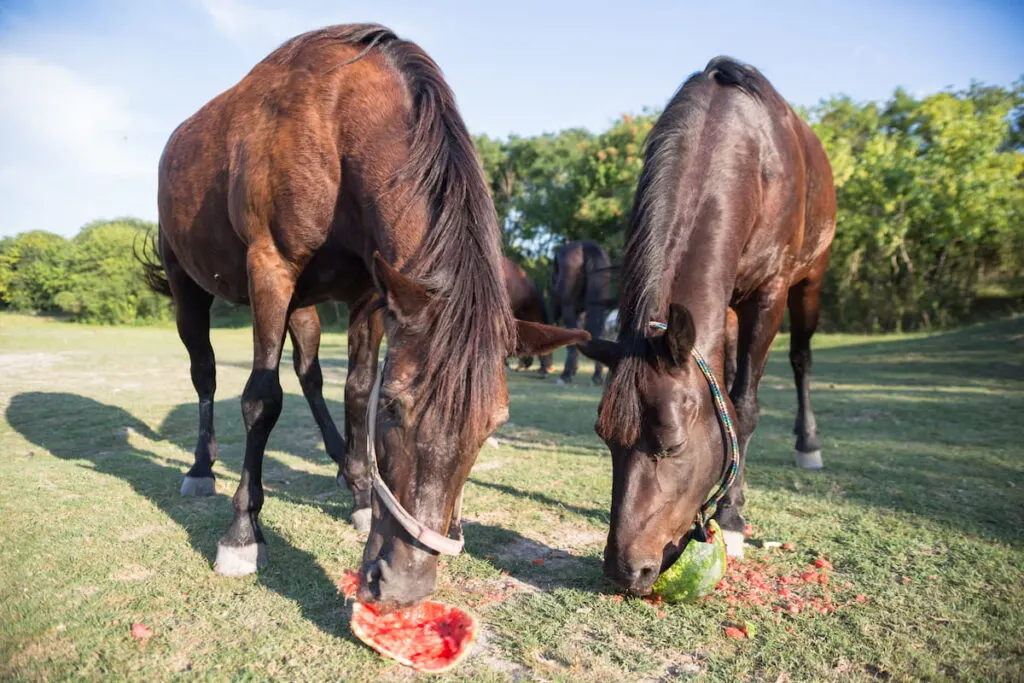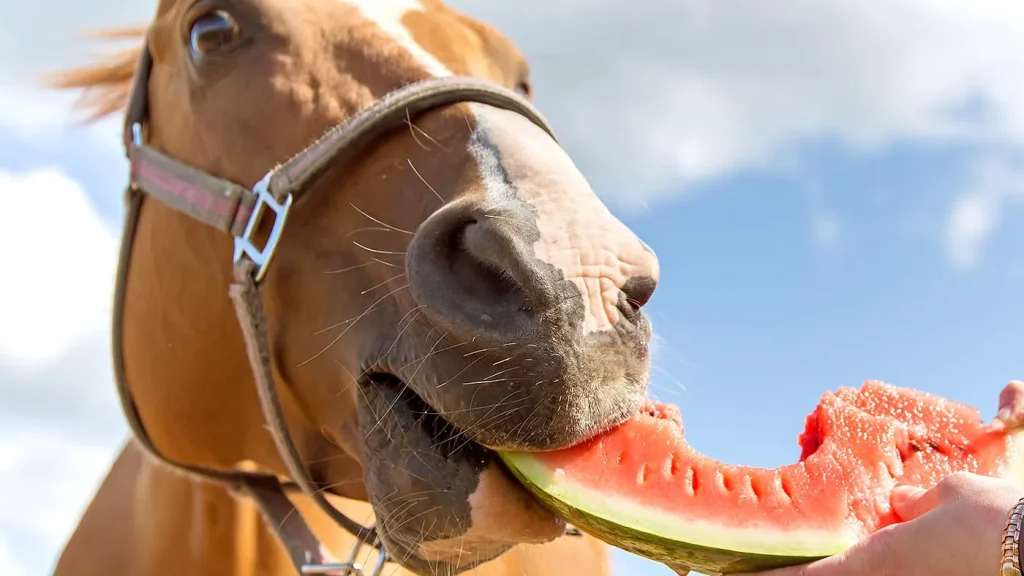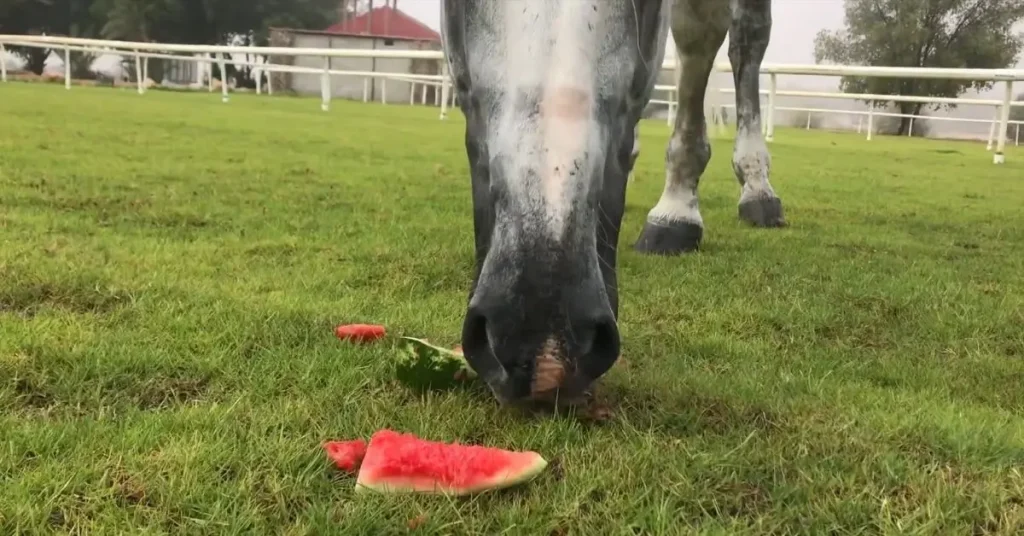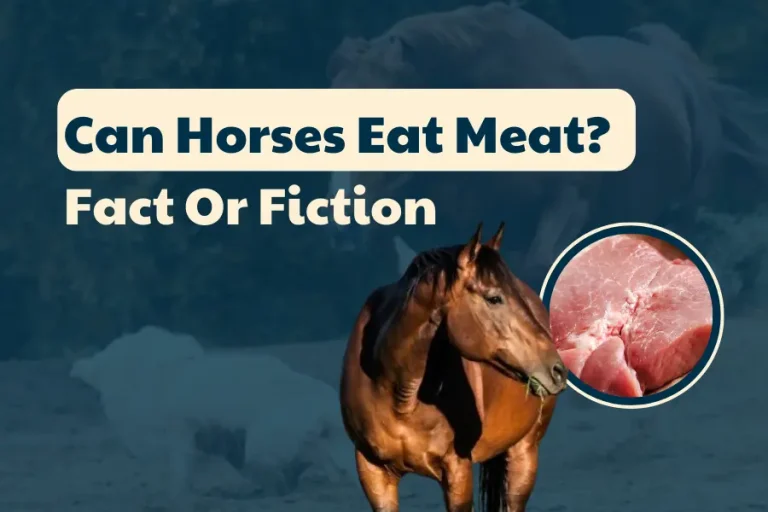Can A Horse Eat Watermelon? Benefits & Simple Feeding Tips

Watermelon is one of our favorite fruit treats in the summer. This is because watermelons are super refreshing with a high content of water, and sweetness with bright red flesh. Watermelon is full of vitamins and other antioxidants, making it very beneficial for human health. And a rising question would be: “Can a horse eat watermelon?”
If you want to feed your horse with watermelon but remain a little worried, keep reading this article. You’re going to learn if it’s safe for horses to consume watermelon, ways of feeding them properly, and the risks of adding watermelon to their diet.
Can A Horse Eat Watermelon?
Can a horse eat watermelon? Yes, horses can eat watermelon. Indeed, horses are allowed to take watermelon as part of their diet. Many horses love watermelon and in small quantities, the fruit truly has many benefits for them. On the other hand, vice versa will happen if horses overstuff their stomachs with watermelons. Hence, it is important to know how to feed watermelon to horses properly.
Nutritional Benefits of Feeding Horses With Watermelon
Can a horse eat watermelon? This is not only a refreshing treat for humans but also horses. Here are the key benefits when one feeds their horses with watermelon:
- Hydration: Due to its water content of up to 90%, watermelons are among the best sources of water for horses, especially during hot sunny days.
- Rich in Vitamins: It is also very rewarding in important vitamins such as vitamins A and C. Vitamin A is vital in the overall health of vision and the immune system. Vitamin C is in charge of the security of cells from harm and boosts immune function.
- Natural Electrolytes Source: Watermelon has some electrolytes, particularly potassium which is vital for muscle and nervous systems in horses as well as in the balancing of fluids. That makes watermelon an ideal food for horses particularly after they have exercised or when the weather is hot.
- Low in Calories & Fat: Watermelon is very low in calories and contains almost zero percentage of fat, thus making it a perfect treat for horses. This will assist in preventing the animals from acquiring obesity and the resulting health problems.
- Digestive Aid: The amount of fiber in watermelon can promote a healthy digestive system in horses. Fiber keeps bowel movements regular and at times can prevent certain issues like colic.
Risks When Feeding Watermelon to Horses

While watermelon can be a healthy treat for horses, there are some potential risks associated with feeding them this food. The key risks will include:
- Stomach Upset: If a horse takes on a large amount of watermelon at once, it can experience digestive problems such as colic, diarrhea, or bloating. Since horses have sensitive stomachs, an overwhelming amount of watermelon may unbalance their stomachs.
- Choking Hazard: Seeds and skin of watermelons are a potential choking hazard, so they should always be cut into small and manageable pieces. Seeds can also block the digestive tract (very little chance), while the rind can be pretty tough for some horses to chew and digest properly. Pick up seedless watermelon if you worry about seed choking risk.
- Sugar Content: While relatively low in calories, watermelon does pack natural sugars (about 10g of sugar for a cup). Feeding too much can be a concern for horses with insulin resistance, colic, and laminitis.
- Gain Weight: Feeding watermelon too frequently or in large quantities may contribute to weight gain in horses already predisposed to obesity. The high-level natural sugar content will add up to caloric intake.
- Toxins: If you feed the horses watermelon with skin, you may need to consider the toxins and bacteria (herbicides, pesticides, and E. Coli). You need to wash watermelons carefully and choose organic ones for best.
How To Feed Watermelon To Horses Safely
Now, we all have the answer to “Can a horse eat watermelon?”. But how to serve horses with watermelon safely is something you need to learn. Keep reading on to master some tips below:
Can A Horse Eat Watermelon Skin?
Yes, horses can eat watermelon skin. You can enjoy eating watermelon flesh and leave the skin for horses. Just remember to cut them into small pieces to minimize the chokes. Some horses may enjoy the watermelon skin, while others may find it difficult to eat or don’t like its taste and texture.
Can A Horse Eat Watermelon Seeds?

Watermelon seeds are not toxic to horses and the risks of choking is very low. However, large quantities of seeds can lead to digestive blockages. You should get rid of all the seeds or simply choose seedless watermelon to save your time.
How Many Watermelons Should You Feed A Horse?
Can a horse eat watermelon? Yes, but horses should get watermelon in moderation and as an addition to their regular diet. A few slices will be enough, meaning about 1-2 cups of this fruit.
Tips To Prepare Watermelon To Feed Horses
Feeding your horse watermelon is fun and healthy when done right. Below are tips on how to go about the safe preparation of watermelon for your horse:
Choose A Fresh Watermelon
The watermelon must be ripe and fresh, without any sign of spoiling or mold. A good watermelon will feel heavy for its size and have a consistent color.
Wash Watermelon Thoroughly
Before cutting into a watermelon, always wash it. There will be some amount of dirt, pesticides, or bacteria on the rind that you don’t desire to exist in your horse’s gut. Even in case you won’t feed the skin to your horse, cleanliness is still paramount when you cut through the fruit.
Remove the Seeds
You should not feed watermelon with seeds to your horse, as these can cause choking or digestion problems. The best option for you is a watermelon without seeds or try to get rid of all seeds before feeding your horses.
Cut into Small Pieces
Cut up the watermelon into small and bite-sized pieces so that your horse can chew it easily without developing any choking risks. If you wish to feed them the skin, then it is recommended to chop it into thin strips or small chunks for better digestion.
Remove the Rind (Optional)
If you are concerned with the toughness of the rind, you can remove it altogether before feeding your horse. While some horses enjoy the rind, others may find it difficult to chew. Thus, it is vital to understand your horse’s habits.
Introduce Gradually
If your horse is new to watermelon, introduce it gradually. Allow him a small amount initially and monitor his reaction for signs of discomfort, allergies, or digestive problems. Gradually increase his serving if he is enjoying it and doesn’t have any adverse reactions.
Serve In A Clean Feeding Area
Keep the area where you feed the watermelon clean to avoid contamination. If outdoors, you can place the chunks of watermelon in a feed bucket or on a clean surface.
Alternatives of Watermelon For Hot Summer Days

Can a horse eat watermelon? But besides watermelon, many other fruits and vegetables can be served to horses on hot summer days. Here are some fantastic options:
- Cucumbers: Cucumbers are made up of about 95% water, making them fantastically hydrating. They are also very low in calories and have a mild, refreshing flavor that most horses just love.
- Apples: Juicy and naturally high in sugar, fiber, and vitamins like C, apples are a great food choice instead of watermelon. They are refreshing and will help keep your horse hydrated.
- Pears: Pears are another juicy fruit that will provide hydration and other essential elements in the diet of horses, including fiber and vitamin C.
- Carrots: Carrots are high in fiber, hydration, and beta-carotene. Not quite as water-rich as the watermelon, they are still very hydrating and quite palatable to horses in general.
- Celery: This kind of vegetable is an extremely calorie-efficient vegetable with a high water content that tastes crisp and pleasant. It also contains fiber and important vitamins, including vitamin K.
- Strawberries: These fruits are delicious, hydrating, and packed with vitamins. especially vitamin C. They are also low in calories and act as good antioxidants.
- Blueberries: Blueberries are small and refreshing fruits that are rich in many vitamins and antioxidants. They represent a low-calorie treat that most horses enjoy.
- Romaine Lettuce: This kind of lettuce consists mainly of water, offering some fiber and vitamins. It’s light and hydrating, so it’s great on a really hot day.
Creative Ways To Make Treats With Watermelon For Horses
Here are a few ideas to jazz these treats up and make them more interesting and enjoyable for your horse:
- Watermelon & Carrot Popsicles: Mix pureed watermelon with grated carrots. Fill popsicle molds or ice cube trays with the mixture and freeze.
- Frozen Slices of Watermelon: Slice watermelon into thick and manageable chunks then freeze. Give your horse the frozen slices straight away as a refreshing treat on a hot day.
- Watermelon & Apple Salad: Dice up small chunks of both watermelon and apples, removing seeds from both. Mix all together in a bowl. Place this yummy salad in your horse’s feed bucket for a refreshing snack.
- Watermelon & Oat Bites: Combine pureed watermelon with oats and a little honey or molasses (optional) to form a dough. Roll the mixture into small balls and chill them.
Final Words
We’re quite sure that you got the answer to “Can a horse eat watermelon?” right now. Although watermelon is a delicious treat, don’t let your horse eat it too much. Avoid tossing a large chunk of watermelon towards them. Make sure to choose fresh watermelon and cut it up before serving the horses.



